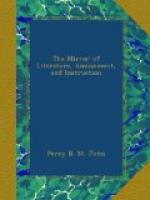W.G.C.
* * * * *
Curious Marriage.—In the church of St. Martin, formerly called St. Crosse, Leicester, the marriage register contains an entry of the names of Thomas Tilsey and Ursula Russel, the first of whom being “deofe and also dombe,” it was agreed by the bishop, mayor, and other gentlemen of the town, that certain signs and actions of the bridegroom should be admitted instead of the usual words enjoined by the Protestant marriage ceremony: “First he embraced her with his armes, and tooke her by the hande, put a ringe upon her finger, and laide his hande upon his harte, and upon her harte, and helde up his handes towards heaven; and, to shew his continuance to dwell with her to his lyves ende, he did it by closing of his eyes with his hands, and digging out the earthe with his fete, and pullinge as though he would ringe a bell, with divers other signes approved.”
P.T.W.
* * * * *
Fanny Kemble Tulip.—This famous tulip which was sold a few weeks since for L100. was raised by a Mr. Clarke, of Croydon, Surrey, lately deceased. He was considered to have a first-rate show of tulips, and spent much of his time in their cultivation; the remainder of the bed was knocked down for L500. The above gentleman was an infatuated admirer of Miss Kemble, and, as a token of his admiration he named his favourite tulip after her. He was a man of the most eccentric habits: though possessed of a competent fortune, he was continually harrassed by the fear of coming to poverty—and so powerfully was he impressed with the dread of being buried in a trance, that he ordered in his will, two panes of glass to be introduced in his coffin lid, and that he should be placed in the vault without being screwed down.
SWAINE.
* * * * *
In answer to H.H. who advertises in No. 568, p. 208, of The Mirror, for a translation in one line rhyming with Virgil’s hemistich:
Mollissima tempora fandi—
the following is suggested:
Times for persuasive speech most meet and handy.
The following motto for a tea-caddy was quoted by the celebrated J. Wilkes:
Te veniente die, Te discedente.
And when Dr. Johnson complained to Mrs. Piozzi, that her tea was so strong as to make him tipsy, he was thus answered by that learned lady:
Equidem de Te nil tale verebar.
E.B.I.
* * * * *
Dum aeger ait, “ah! ah!”
Tu dicito, “da, da.”
Mirror, No. 568, p. 208.
Translation.
While the sick man in pain cries out “ah!
me!”
Tell him “before I cure, first pay
my fee.”
Another.
Whilst your patient sighs, “ah,
me!”
You must cry, “my fee, my fee!!”
C.B.




